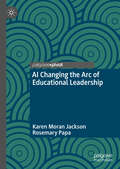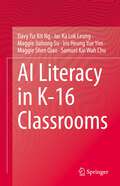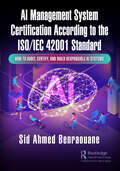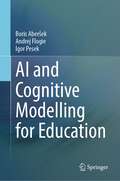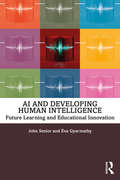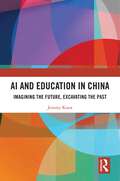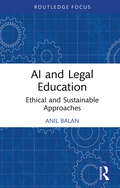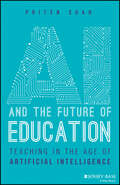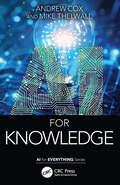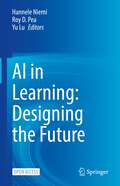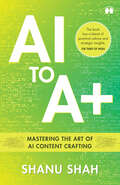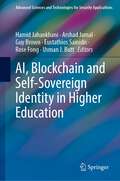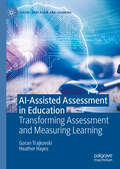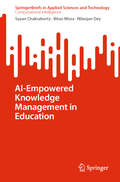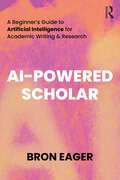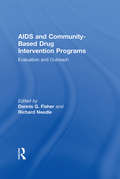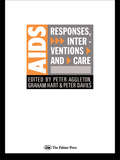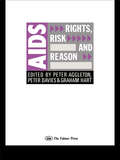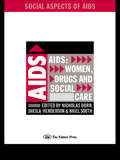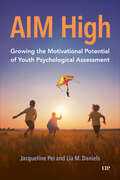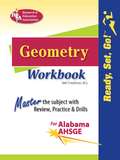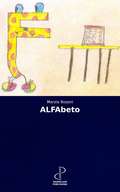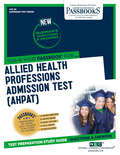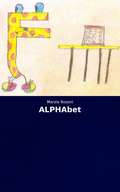- Table View
- List View
AI Changing the Arc of Educational Leadership
by Rosemary Papa Karen Moran JacksonAs artificial intelligence becomes an all-encompassing issue in education and beyond, this book seeks to answer how it will change the arc of educational leadership in K-12 schooling. Educators and leaders serve as the champions and gatekeepers of technology use in schools. They need to consider how AI can change education for the better while keeping in mind cultural, social, and emotional concerns that cannot be isolated from educational settings. Jackson and Papa examine existing literature and include insightful interviews with professionals in AI and education to understand how educators currently perceive and use AI. They also illustrate the similarities and differences in how educators and A.I.ED developers envision AI's present and future.
AI Literacy in K-16 Classrooms
by Samuel Kai Chu Davy Tsz Ng Jac Ka Leung Maggie Jiahong Su Iris Heung Yim Maggie Shen QiaoArtificial Intelligence is at the top of the agenda for education leaders, scientists, technologists and policy makers in educating the next generation across the globe. Beyond applying AI in daily life applications and educational tools, understanding how to learn and teach AI is increasingly important. Despite these emerging technology breakthroughs, AI learning is still new to educators especially to K-16 teachers. There is a lack of evidence-based studies that inform them about AI learning, including design principles for building a set of curriculum content, and pedagogical approaches as well as technological tools. Teaching AI concepts and techniques from programming languages and developmentally appropriate learning tools (e.g., robotics, serious games, software, intelligent agents) across different education levels emerged in recent years. The primary purpose of this book is to respond to the need to conceptualize the emerging term “AI literacy” and investigate how to teach and learn AI in K-16 education settings.This book examines different aspects of learning artefacts, pedagogies, content knowledge and assessment methods of AI literacy education, from theoretical discussions to practical recommendations for curriculum and instructional design. An exhaustive summary of current evidence with examples is illustrated in this book, as well as cutting-edge research that serves as an AI literacy model for different countries’ contexts. Part I, “Conceptualizing AI literacy”, provides a detailed discussion on the development of the concepts and frameworks on AI literacy education, discusses the differences and similarities between AI in education (AIED) and AI literacy education, and illustrates the reasons why K-16 students need to learn AI. These concepts are brought together in Part II, “K-16 AI literacy education” to further summarize the pedagogies, learning content, learning tools and assessment methods to inform K-16 educators how to design their AI instruction at each education level. After that, part III “AI literacy for instructional designers” explores how instructional designers (i.e., AI developers and teachers) prepare themselves to become ready to design developmentally appropriate tools, platforms, services and curricula to empower students with AI literacy skills.
AI Management System Certification According to the ISO/IEC 42001 Standard: How to Audit, Certify, and Build Responsible AI Systems
by Sid Ahmed BenraouaneThe book guides the reader through the auditing and compliance process of the newly released ISO Artificial Intelligence standard. It provides tools and best practices on how to put together an AI management system that is certifiable and sheds light on ethical and legal challenges business leaders struggle with to make their AI system comply with existing laws and regulations, and the ethical framework of the organization.The book is unique because it provides implementation guidance on the new certification and conformity assessment process required by the new ISO Standard on Artificial Intelligence (ISO 42001:2023 Artificial Intelligence Management System) published by ISO in August 2023. This is the first book that addresses this issue.As a member of the US/ISO team who participated in the drafting of this standard during the last 3 years, the author has direct knowledge and insights that are critical to the implementation of the standard. He explains the context of how to interpret ISO clauses, gives examples and guidelines, and provides best practices that help compliance managers and senior leadership understand how to put together the AI compliance system to certify their AI system. The reader will find in the book a complete guide to the certification process of AI systems and the conformity assessment required by the standard. It also provides guidance on how to read the new EU AI Act and some of the U.S. legislations, such as NYC Local Law 144, enacted in July 2023.This is the first book that helps the reader create an internal auditing program that enhances the company’s AI compliance framework. Generative AI has taken the world by storm, and currently, there is no international standard that provides guidance on how to put together a management system that helps business leaders address issues of AI governance, AI structure, AI risk, AI audit, and AI impact analysis. ISO/IEC 42001:2023 is the first international mandatory and certifiable standard that provides a comprehensive and well-integrated framework for the issue of AI governance. This book provides a step-by-step process on how to implement the standard so the AI system can pass the ISO accreditation process.
AI and Cognitive Modelling for Education
by Boris Aberšek Andrej Flogie Igor PesekThis book offers a groundbreaking approach to bridging the gap between various disciplines involved in cognitive modeling in education. By drawing on the fields of learning, neuro science, cognitive science, neurobiology, and computer science, it provides a new perspective on how we can integrate these disciplines with education to create more effective learning environments. The main objective of this book is to delve into the ethical, sociological, and technological questions surrounding the introduction of intelligent and smart learning environments in education. By analyzing these issues, this book aims to bridge the gap between the various disciplines involved in cognitive modeling and education, while highlighting the benefits and risks associated with these advancements. With the emergence of AI-based tutors, coaches, and learning environments, students now have access to a new type of self-learning and self-training that was previously unavailable. Distance learning has become increasingly popular in recent years, and the use of computer-assisted learning tools has revolutionized the way we think about education. The goal of education must be to instill in students a desire to learn for themselves, and this can only be achieved through active, self-directed, and reflective learning. With intelligent tutoring systems, students are empowered to take an active role in their own education, rather than simply being passive recipients of information. This book offers practical strategies for teachers to facilitate this transition, enabling them to act as facilitators and guides rather than one-way communicators. By embracing this new approach to education, we can help students become lifelong learners who are equipped with the skills they need to succeed in the 21st century. As we cannot predict the future with certainty, the true effects of education may only be revealed in the long run, making it critical to understand the potential consequences of introducing these new learning tools. By exploring these complex topics, this book offers valuable insights for educators, policymakers, and anyone interested in the future of education.
AI and Developing Human Intelligence: Future Learning and Educational Innovation
by John Senior Éva GyarmathyAs the relationship between AI machines and humans develops, we ask what it will mean to be an intelligent learner in an emerging, socio-dynamic learningscape. The need for a new global view of intelligence and education is the core discussion of this future-focussed collection of ideas, questions, and activities for learners to explore. This fascinating guide offers activities to understand what needs to be changed in our educations systems and our view of intelligence. As well as exploring AI, HI, the future of learning and caring for all learners, this book addresses fundamental questions such as: How do we educate ourselves for an increasingly uncertain future? What is the purpose of intelligence? How can a curriculum focussing on human curiosity and creativity be created? Who are we and what are we becoming? What will we invent now that AI exists? AI and Developing Human Intelligence will interest you, inform you, and empower your understanding of "intelligence" and where we are going on the next part of our journey in understanding what it is to be human now and tomorrow.
AI and Education in China: Imagining the Future, Excavating the Past
by Jeremy KnoxThis book explores the relationships between artificial intelligence (AI) and education in China. It examines educational activity in the context of profound technological interventions, far-reaching national policy, and multifaceted cultural settings. By standing at the intersection of three foundational topics – AI and the recent proliferation of data-driven technologies; education, the most foundational of our social institutions in terms of actively shaping societies and individuals; and, finally, China, which is a frequent subject for dramatic media reports about both technology and education – this book offers an insightful view of the contexts that underpin the use of AI in education, and promotes a more in-depth understanding of China. Scholars of educational technology and digital education will find this book an indispensable guide to the ways new technologies are imagined to transform the future, while being firmly grounded in the past.
AI and Legal Education: Ethical and Sustainable Approaches (Routledge Research in the Law of Emerging Technologies)
by Anil BalanThis book provides a comprehensive interdisciplinary analysis of the sustainable and ethical integration of artificial intelligence (AI) within legal education, offering practical strategies for balancing innovation with ethical responsibility. Discussing the intersection of legal studies, technology and ethics, the book focuses on AI's role in reshaping professional education.With the rising demand for digital transformation in legal education and the increasing scrutiny of AI's ethical impact, this book explores the potential of AI to enhance legal learning and practice, while critically examining the challenges of data privacy, algorithmic bias and equitable access to technology. Outlining a framework for incorporating AI into the law curriculum, the book equips the readers with both cutting-edge technological skills and a deep understanding of AI’s ethical and societal implications. Drawing on a wide range of sources, including industry data and academic research, the book offers grounded, actionable guidance on implementing AI in a way that promotes inclusivity, sustainability and long-term relevance. It addresses the needs of legal education institutions, faculty and students, providing them with the tools to navigate the evolving legal landscape while maintaining ethical standards.The book will also be of interest to researchers in the fields of law, education and AI ethics.
AI and the Future of Education: Teaching in the Age of Artificial Intelligence
by Priten ShahClear away the fog surrounding AI in education—and regain your peace of mind Among teachers, there is a cloud of rumors, confusion, and fear surrounding the rise of artificial intelligence. AI and the Future of Education is a timely response to this general state of panic, showing you that AI is a tool to leverage, not a threat to teaching and learning. By understanding what AI is, what it does, and how it can be used to enhance education, you can let go of anxiety and uncertainty, and learn to embrace artificial intelligence. It's true that, along with tremendous opportunities, AI presents some challenges for the field of education. In this book, Priten Shah, a Harvard M.Ed. with a robust background in educational innovation, helps you face these challenges head on, so you can gain the knowledge and skills you need to use AI effectively in your classroom. Thanks to this thorough consideration of ethical considerations and practical approaches, you can develop your own strategy for leveraging AI in administrative tasks, lesson design, professional development, and beyond. Understand what AI and machine learning are, and learn about new developments like ChatGPT Discover strategies for engaging students more fully using AI Automate administrative tasks, grading and feedback, and assessments Use AI in innovative ways to promote higher-order thinking skills Examine ethical considerations of AI, including the achievement gap, privacy concerns, and bias For K-12 educators, as well as leaders and policymakers who want to understand the role of technology in education, AI and the Future of Education is a valuable resource that can change AI from an unknown entity to an indispensable tool.
AI for Knowledge (AI for Everything)
by Mike Thelwall Andrew CoxAI for Knowledge explores the question of whether artificial intelligence (AI) is transforming knowledge access and creation for the good. AI is accelerating our access to knowledge through search, recommendation, summarisation, translation and a proliferating range of tools with AI built in. Generative AI is further changing how we use and create information at home and in the workplace. Yet AI also has a dark side with hallucination, bias and lack of explainability, as well as potential for harmful impacts on social equity and the environment.The book investigates how AI will impact everyday knowledge discovery, understanding and creation. It considers both the positive benefits and the many informational and ethical challenges, including the impact on our wider information culture. It then weighs up the impact on scholarship, in science, social science and the humanities and including the processes of scholarly communication. It explains the role of libraries and archives and how they could be enhanced using AI. It concludes by showing how governments can regulate AI to ensure social benefit and outlines what we as individuals need to know about AI.The book helps the reader see through some of the AI hype to understand much more clearly what are the issues around the impact of AI on knowledge access and creation, including the implications for environmental sustainability and the power of Big Tech. What emerges is a nuanced picture of potential benefit and risk, especially when we consider the experiences of those with less privileged access to the digital, particularly those outside the Global North.
AI in Learning: Designing the Future
by Hannele Niemi Yu Lu Roy D. PeaAI (Artificial Intelligence) is predicted to radically change teaching and learning in both schools and industry causing radical disruption of work. AI can support well-being initiatives and lifelong learning but educational institutions and companies need to take the changing technology into account. Moving towards AI supported by digital tools requires a dramatic shift in the concept of learning, expertise and the businesses built off of it. Based on the latest research on AI and how it is changing learning and education, this book will focus on the enormous opportunities to expand educational settings with AI for learning in and beyond the traditional classroom. This open access book also introduces ethical challenges related to learning and education, while connecting human learning and machine learning. This book will be of use to a variety of readers, including researchers, AI users, companies and policy makers.
AI to A+
by Shanu ShahUnlock the true power of your AI-generated content with AI to A+. Packed with practical strategies and proven techniques, this book equips you with the tools to elevate your writing to new heights. Each chapter presents a carefully crafted rubric designed to transform your drafts into polished, compelling narratives.Whether you are a seasoned content creator or just beginning to explore the world of generative AI, this guide offers actionable insights to make your work stand out. With a handy checklist and key takeaways included, applying these principles becomes a seamless part of your writing routine.More than just a manual, AI to A+ is your strategic partner in mastering the art of AI content editing. So, start your journey towards content excellence today and discover how to make every word count.
AI, Blockchain and Self-Sovereign Identity in Higher Education (Advanced Sciences and Technologies for Security Applications)
by Hamid Jahankhani Guy Brown Arshad Jamal Eustathios Sainidis Rose Fong Usman J. ButtThis book aims to explore the next generation of online learning challenges including the security and privacy issues of digital transformation strategies that is required in teaching and learning. Also, what efforts does the industry need to invest in changing mind-sets and behaviours of both students and faculty members in adoption of virtual and blended learning?The book provides a comprehensive coverage of not only the technical and ethical issues presented by the use of AI, blockchain and self-sovereign identity, but also the adversarial application of AI and its associated implications. The authors recommend a number of novel approaches to assist in better detecting, thwarting and addressing AI challenges in higher education.The book provides a valuable reference for cyber security experts and practitioners, network security professionals and higher education strategist and decision-makers. It is also aimed at researchers seeking to obtain a more profound knowledge of machine learning and deep learning in the context of cyber security and AI in higher education. Each chapter is written by an internationally renowned expert who has extensive experience in industry or academia. Furthermore, this book blends advanced research findings with practice-based methods to provide the reader with advanced understanding and relevant skills.
AI-Assisted Assessment in Education: Transforming Assessment and Measuring Learning (Digital Education and Learning)
by Goran Trajkovski Heather HayesThis book explores the transformative role of artificial intelligence in educational assessment, catering to researchers, educators, administrators, policymakers, and technologists involved in shaping the future of education. It delves into the foundations of AI-assisted assessment, innovative question types and formats, data analysis techniques, and the practical implementation of AI tools in various educational settings. The book addresses the pressing need for more efficient, personalized, and effective assessment methods in an increasingly complex educational landscape. It tackles the challenge of balancing technological innovation with ethical considerations, data privacy, and the preservation of human judgment in education. By examining AI's potential to enhance learning outcomes, provide real-time feedback, and offer insights into student progress, the book aims to equip readers with the knowledge and strategies necessary to navigate the evolving intersection of AI and assessment. It acknowledges the challenges and ethical implications of integrating AI into high-stakes testing while offering guidance on implementing these technologies responsibly. Through case studies, best practices, and forward-looking analysis, the book serves as a comprehensive guide for those seeking to leverage AI to create more engaging, equitable, and effective assessment practices, ultimately aiming to improve the overall quality of education in a rapidly changing world.
AI-Empowered Knowledge Management in Education (SpringerBriefs in Applied Sciences and Technology)
by Nilanjan Dey Sayan Chakraborty Bitan MisraThis book explains basic ideas behind several methods used in artificial intelligence-based knowledge management techniques. It also shows how these techniques are applied in practical contexts in different education sectors. The book discusses AI-based knowledge management applications, AI-empowered knowledge management in primary and higher education, and technical and ethical challenges and opportunities.
AI-Powered Scholar: A Beginner’s Guide to Artificial Intelligence for Academic Writing & Research
by Bron EagerThis book is a practical and comprehensive guide on using AI tools to streamline and optimise the academic writing and research process.Through a series of step-by-step instructions and practical tips, this book provides readers with the knowledge and tools they need to leverage the power of AI to produce high-quality academic publications. The text covers the historical context of AI development, techniques for communicating with AI systems, and strategies for transforming AI into helpful research assistants. Readers will discover the art of prompt engineering and learn practical applications for using AI to ideate research projects, conduct literature searches, and accelerate academic writing. Emphasis is placed on the responsible use of AI, positioning it as an extension of human capabilities rather than a replacement. Through real-world examples, complex AI concepts are demystified, and key challenges and limitations are addressed head-on.Whether you're a university student or a tenured professor, this book is your indispensable companion to beginning your path towards becoming an AI-powered scholar.
AIDS and Alcohol/Drug Abuse: Psychosocial Research
by Dennis FisherAIDS is the number one health issue facing the nation today. The way in which AIDS relates to substance abuse is explored by drug abuse researchers in this timely volume. A major focus of AIDS and Alcohol/Drug Abuse is on the problems of conducting AIDS research on racial minorities in this country. Bringing together experts in the field, this volume examines the specific obstacles and challenges researchers have faced in assessing and addressing the needs of underserved populations and maps routes and procedures that can improve both research and available health care services.This unique volume also focuses on aspects of HIV infection that have received little attention elsewhere. It includes the first information published in the open literature about intravenous drug use in Alaska. Another chapter highlights some little-known facts that relate substance abuse to HIV infection in the American Indian/Alaskan Native population, among whom--it has been predicted--a devastating epidemic of HIV infection is likely. Problems with prevention, research, and treatment of individuals who are both intravenous drug users and who are infected with HIV are explored. Other chapters look at the transmission of HIV infection--by gay men who are alcoholics and by intravenous drug users. AIDS and Alcohol/Drug Abuse ends with hopeful chapter for AIDS prevention. Readers interested in the relationship of intravenous drug use and HIV infection, particularly among racial and ethnic minorities, will find this to be a practical, readable book. In particular, substance abuse counselors and researchers, and anyone involved in the AIDS prevention movement will find a valuable wealth of information.
AIDS and Community-Based Drug Intervention Programs: Evaluation and Outreach
by Dennis Fisher Richard NeedleDelve into the uncharted territory of the “hidden” drug addict--users who are not in treatment, not incarcerated, and not officially accessible for research purposes through traditional means. AIDS and Community-Based Drug Intervention Programs describes short-term interventions used to reduce the odds that these drug users will get infected by the Human Immunodeficiency Virus (HIV). The book explains new methods that are being developed, such as targeted sampling, social network analysis, geomapping, and other amalgams of both quantitative and qualitative approaches, that need to be forged to overcome the challenges of the war against AIDS. The research described in this important book was conducted under the Cooperative Agreement for AIDS Community-Based Outreach/Intervention Research funding mechanism of the National Institute on Drug Abuse (NIDA). Chapters include research on several ethnic groups, including Alaska natives, Puerto Ricans, and Navaho teens. AIDS and Community-Based Drug Treatment Programs, written by experts in the field, is a broad-based treatment of the subject by those who are actually doing the work in the trenches. Authors cover topics such as: the use of goal-oriented counseling and peer support to reduce HIV/AIDS risk quantitative and qualitative methods to assess behavioral change among injection drug users (IDUs) the importance of sampling from hidden populations in research a public health model for reducing AIDS-related risk behavior among IDUs and their sexual partners characteristics of female sexual partners of IDUs strategies used to implement random sampling strategies in the recruitment of out-of-treatment crack and IDUs ethnographic analysis of intravenous drug use analysis of contact tracing strategies employed to combat the AIDS epidemic the use of pile sorts to enhance other tools used by drug prevention programsAIDS and Community-Based Drug Intervention Programs is full of current research and useful information for professionals interested in learning about strategies for conducting HIV/AIDS research among hard-to-reach populations. Substance abuse researchers, treatment professionals, and people involved in AIDS prevention programs, state and county health departments, and criminal justice systems will find much relevant and important information to use in their daily work.
AIDS: Responses, Interventions And Care (Social Aspects of AIDS #Vol. 4)
by Peter Davies Peter Aggleton Graham HartFirst published in 1991. Routledge is an imprint of Taylor & Francis, an informa company.
AIDS: Rights, Risk and Reason (Social Aspects of AIDS #Vol. 5)
by Peter Davies Peter Aggleton Graham HartFirst published in 1992. Routledge is an imprint of Taylor & Francis, an informa company.
AIDS: Women, Drugs And Social Care (Social Aspects of AIDS #Vol. 1)
by Nicholas Dorn Sheila Henderson Nigel SouthExamines the circumstances, experiences and needs of HIV-positive people in Britain and Ireland, and particularly focuses on female drug-users and ex drug-users.
AIM High: Growing the Motivational Potential of Youth Psychological Assessment
by Jacqueline Pei Lia DanielsIn AIM High, Jacqueline Pei and Lia M. Daniels combine their decades of theoretical and applied expertise to bring motivation theory alongside the practice of psychological assessment. The book highlights the opportunity to stand with children and their support teams to aim high, offering a picture of children and youth that meaningfully considers growth and movement for goal attainment. The book explores ways in which all participants in the assessment process – including psychologists, caregivers, and allied professionals – share responsibility to build relational systems, seek understanding about the child, and engage in intentional communication. Pei and Daniels highlight ways in which the referral, assessment, and communication processes of assessment may grow through motivational perspectives that recognise the inherent movement of children. These ideas are leveraged to advance professional practices through the AIM Model (Assessment for Intervention and Motivation), a framework on which readers can organise and evaluate their existing experiences of the practice of psychological assessment, while emphasizing the shared understandings necessary to pursue healthy outcomes for all children. Whether you are just beginning your training to work with children or have been at it for decades, AIM High reveals compelling ideas to help you see the evidence of growth in yourself and the youth with whom you work.
AL AHSGE Geometry Workbook
by Mel FriedmanMany students continue to struggle in high school math courses because they failed to master the basic mathematical skills. REA's new Ready, Set, Go! Workbook series takes the confusion out of math, helping students raise their grades and score higher on important exams--including the Alabama AHSGE. What makes REA's workbooks different? For starters, students will actually like using them. Here's why: Math is explained in simple language, in an easy-to-follow style The workbooks allow students to learn at their own pace and master the subjectMore than 20 lessons break down the material into the basics Each lesson is fully devoted to a key math concept and includes many step-by-step examples Paced instruction with drills and quizzes reinforces learning The innovative "Math Flash" feature offers helpful tips and strategies in each lesson--including advice on common mistakes to avoid Skill scorecard measures the student's progress and success Every answer to every question, in every test, is explained in full detail A final exam is included so students can test what they've learned When students apply the skills they've mastered in our workbooks, they can do better in class, raise their grades, and score higher on the all-important AHSGE. Some of the math topics covered in the Geometry Workbook include:Basic Properties of Points, Rays, Lines, and Angles Measuring Line Segments and Angles Perimeter of Polygons Triangles Circles Quadrilateralsand more!Whether used in a classroom, for home or self study, or with a tutor, this workbook gets students ready for important math tests and exams, set to take on new challenges, and helps them go forward in their studies!
ALFAbeto
by Marzia BosoniALFAbeto es una colección de 17 cuentos muy cortos dirigidos a niños de preescolar y primeros cursos de primaria; el objetivo es explicar de una manera sencilla y divertida la "transformación" de las letras mayúsculas en minúsculas, acompañando así a los niños en el aprendizaje de la escritura. Escritos cuando mi hija asistía a la escuela primaria, le encantaron a la maestra, que propuso que los niños de dos clases de tercer curso ilustraran los cuentos y enriquecieran así las anécdotas cortas con el encanto y el color de las interpretaciones imaginativas de los niños. La obra se compone, por tanto, de 17 páginas, cada una de las cuales contiene la historia y el dibujo que la ilustra.
ALLIED HEALTH PROFESSIONS ADMISSION TEST: Passbooks Study Guide (Admission Test Series)
by National Learning CorporationThe Admission Test Series prepares students for entrance examinations into college, graduate and professional school as well as candidates for professional certification and licensure. The Allied Health Professions Admission Test (AHPAT) Passbook® prepares you by sharpening the skills and abilities necessary to succeed on your upcoming entrance exam. It provides hundreds of questions and answers in the areas that will likely be covered on your upcoming exam, including but not limited to: vocabulary; basic arithmetic; biology; chemistry; and more.
ALPHAbet
by Marzia BosoniALPHAbet est un recueil de 18 histoires très courtes destinées aux enfants des classes maternelles et des premières classes de l’école élémentaire. L’idée est d’expliquer de manière simple et ludique la “transformation” des lettres imprimées en majuscules en lettres minuscules, accompagnant ainsi les enfants dans l’apprentissage de l’écriture. Réalisées lorsque ma fille fréquentait l’école primaire, elles recueillirent l’assentiment de son enseignant qui les fit illustrer par les enfants de deux classes de CE2, enrichissant ainsi les courtes anecdotes avec le charme et la couleur des interprétations fantaisistes des enfants. L’ouvrage se compose ainsi de 18 chapitres comprenant chacun le conte et le dessin qui l’illustre.
